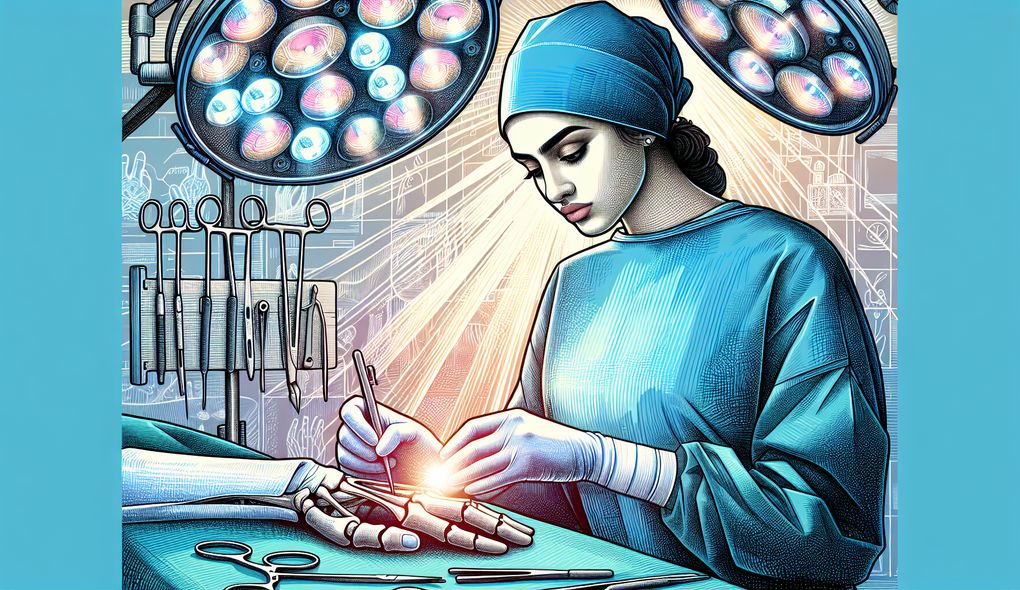How do you manage acute and chronic conditions in hand, wrist, and forearm?
INTERMEDIATE LEVEL

Sample answer to the question:
When managing acute and chronic conditions in the hand, wrist, and forearm, I first ensure a thorough evaluation of the patient's condition by conducting physical examinations and reviewing medical history. In collaboration with the multidisciplinary team, I develop personalized treatment plans that may involve a combination of non-surgical interventions, such as medication, therapy, and immobilization, as well as surgical procedures when necessary. Throughout the treatment process, I maintain clear and consistent communication with patients and their families to address any concerns or questions they may have. Additionally, I stay up to date with the latest advancements in hand surgery through continuous learning and professional development.
Here is a more solid answer:
When managing acute and chronic conditions in the hand, wrist, and forearm, I employ a comprehensive approach to ensure the best possible outcomes for my patients. Firstly, I thoroughly assess each patient's condition through a combination of physical examinations, imaging studies, and in-depth discussions to gain a comprehensive understanding of their specific needs. Drawing on my strong surgical skills and excellent diagnostic abilities, I develop personalized treatment plans that prioritize precision and detail. These plans may involve a range of interventions, including non-surgical treatments like medication, therapy, and splinting, as well as surgical procedures when indicated. Throughout the treatment process, I collaborate closely with a multidisciplinary team, including occupational therapists, physiotherapists, and pain management specialists, to provide comprehensive and holistic care. Strong communication skills are essential in my practice, and I ensure open and clear lines of communication with my patients and their families, addressing their concerns and explaining treatment options in an empathetic and accessible manner. I am committed to continuous learning and professional development in the field of hand surgery, actively participating in conferences, workshops, and research activities to stay updated on the latest advancements. By combining surgical expertise, diagnostic acumen, collaboration, communication, and a commitment to lifelong learning, I strive to deliver the highest standard of care for patients with acute and chronic conditions in the hand, wrist, and forearm.
Why is this a more solid answer?
The solid answer provides more specific details and examples to showcase the candidate's proficiency in the required skills and qualifications for a Hand Surgeon. It highlights the candidate's comprehensive approach to managing hand, wrist, and forearm conditions, as well as their ability to collaborate with a multidisciplinary team and continuously enhance their knowledge and skills. However, the answer could be further improved by providing concrete examples of past experiences and outcomes that demonstrate the candidate's expertise in hand surgery.
An example of a exceptional answer:
In managing acute and chronic conditions in the hand, wrist, and forearm, I rely on a patient-centered approach that integrates meticulous clinical evaluation, advanced surgical techniques, and comprehensive postoperative care. When assessing patients, I meticulously analyze their symptoms, conduct in-depth physical examinations, and utilize cutting-edge imaging technologies to ensure an accurate diagnosis. This enables me to develop custom-tailored treatment plans that optimize patients' functional outcomes and alleviate their pain. Leveraging my strong surgical skills and exceptional diagnostic abilities, I execute surgical procedures with utmost precision and attention to detail, ensuring the best possible outcomes for my patients. To provide comprehensive care, I collaborate closely with a multidisciplinary team, including occupational and physical therapists, to facilitate the rehabilitation and long-term recovery process. Furthermore, I prioritize open and empathetic communication with patients and their families, ensuring that they are fully informed and involved in every stage of their care. By staying abreast of the latest advancements in hand surgery through continuous learning and research, I constantly refine my skills and introduce innovative approaches into my practice. My unwavering commitment to delivering exceptional care is evident in my track record of successful outcomes, where patients experience restored function and improved quality of life. I am eager to bring this level of expertise and dedication to your healthcare team.
Why is this an exceptional answer?
The exceptional answer demonstrates a high level of expertise and experience in managing acute and chronic conditions in the hand, wrist, and forearm. It showcases the candidate's meticulous clinical evaluation, advanced surgical techniques, and commitment to comprehensive postoperative care. The answer also emphasizes the candidate's ability to collaborate with a multidisciplinary team, communicate effectively with patients and their families, and continuously enhance their skills and knowledge in hand surgery. Additionally, the candidate highlights their track record of successful outcomes, which provides strong evidence of their proficiency in the field. Overall, the answer goes above and beyond, exceeding the expectations outlined in the job description.
How to prepare for this question:
- Familiarize yourself with common acute and chronic conditions affecting the hand, wrist, and forearm, and their respective treatment approaches.
- Review the latest advancements in hand surgery and stay updated on emerging techniques and technologies.
- Reflect on your past experiences in managing hand, wrist, and forearm conditions, and prepare specific examples to demonstrate your skills and expertise.
- Practice explaining complex medical concepts in a clear and accessible manner, as effective communication is crucial in this role.
- Highlight your commitment to continuous learning and professional development by mentioning any relevant certifications, courses, or conferences you have attended.
- Consider discussing the importance of a patient-centered approach and how you prioritize empathetic and personalized care.
What are interviewers evaluating with this question?
- Strong surgical skills
- Excellent diagnostic abilities
- Collaboration with multidisciplinary team
- Strong communication skills
- Continuous learning and professional development

